under the dome, paris' first migrants shelter
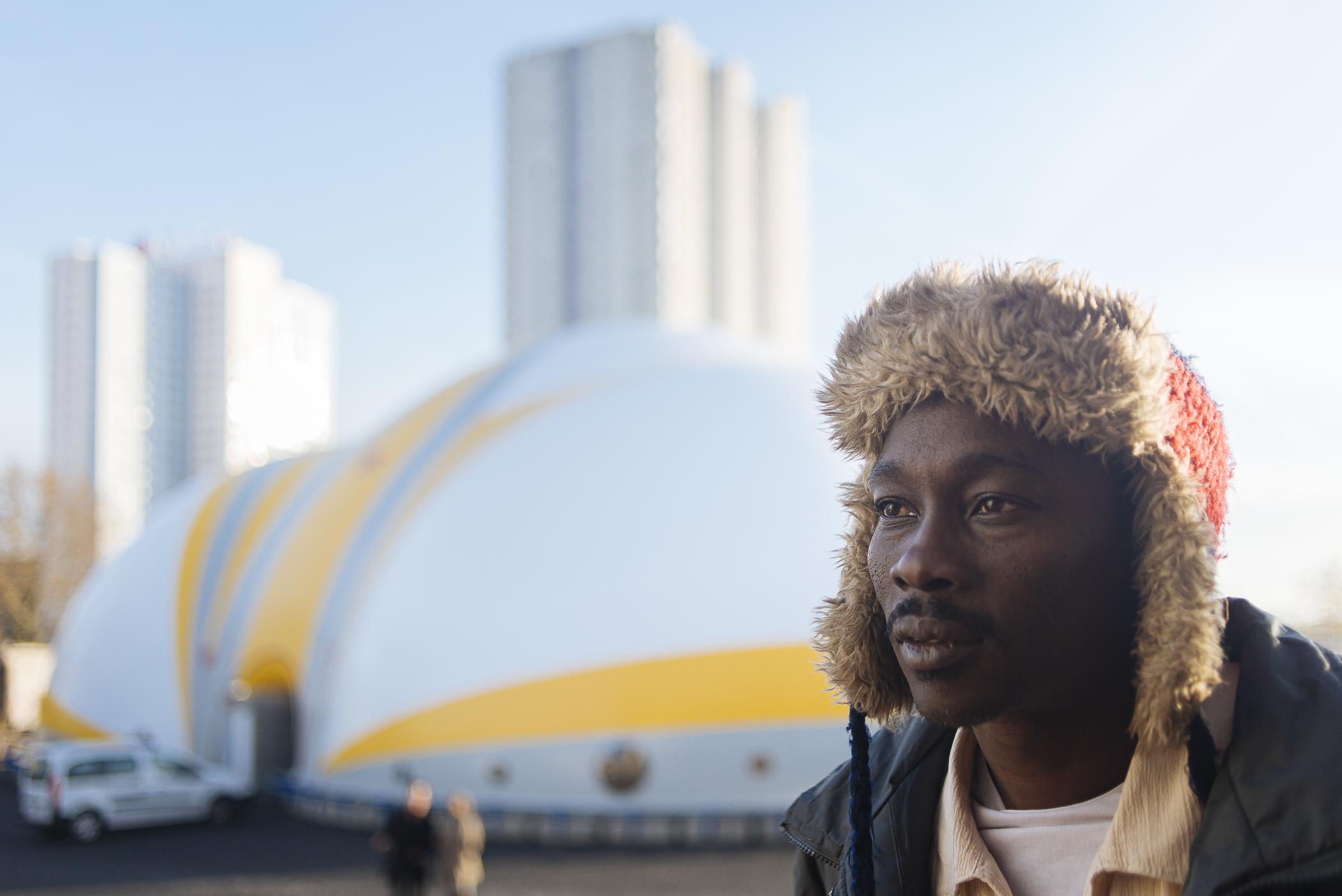
Anis, 29, is Sudanese. He is originally from the town of El-Fasher, in Darfur. Before coming to France, he travelled through Libya and Italy. Anis has been in the La Chapelle humanitarian centre for 6 days and is waiting to find out where he will be sent after an average of 10 days. November 25th, 2016, Paris (France).
For several months in 2016, Paris has been faced with a growing number of informal migrant camps on its streets, particularly in the north of the capital. Associations estimate that between 50 and 100 people are arriving every day, while existing shelter capacity is already saturated. To remedy this dire situation, the decision was taken to set up a humanitarian centre for migrants. The centre is the first of its kind to open in the French capital.
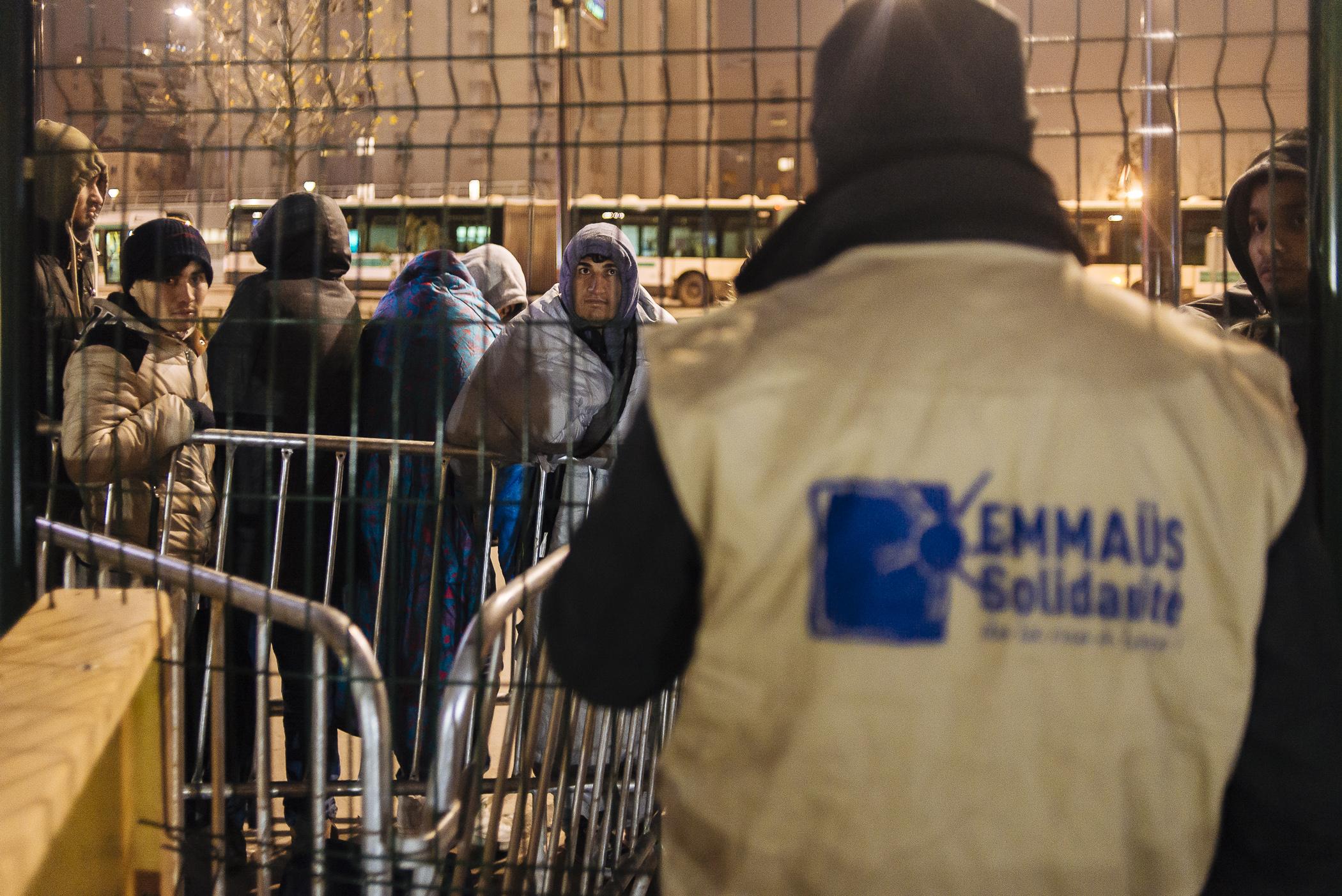
In front of the La Chapelle centre run by Emmaüs Solidarité, many people have been queuing for hours to be among the first 50 to be offered accommodation and rehousing solutions depending on their administrative situation. The doors won't open until 7.30/8.00am every day. November 25th, 2016, Paris (France).
The new facility, in a former SNCF building, has a capacity of 400 places for single men for a period of five to ten days. The people housed are first-time arrivals, most of whom have just crossed the Mediterranean or the mountains that separate France from Italy. Mostly Sudanese, Afghans, Eritreans or Somalis, the residents of the centre find here an alternative to the informal settlements of nearby Stalingrad. The Centre allows them to take a breather, rest and, if their administrative situation allows them to stay in France, to start the process of applying for asylum.
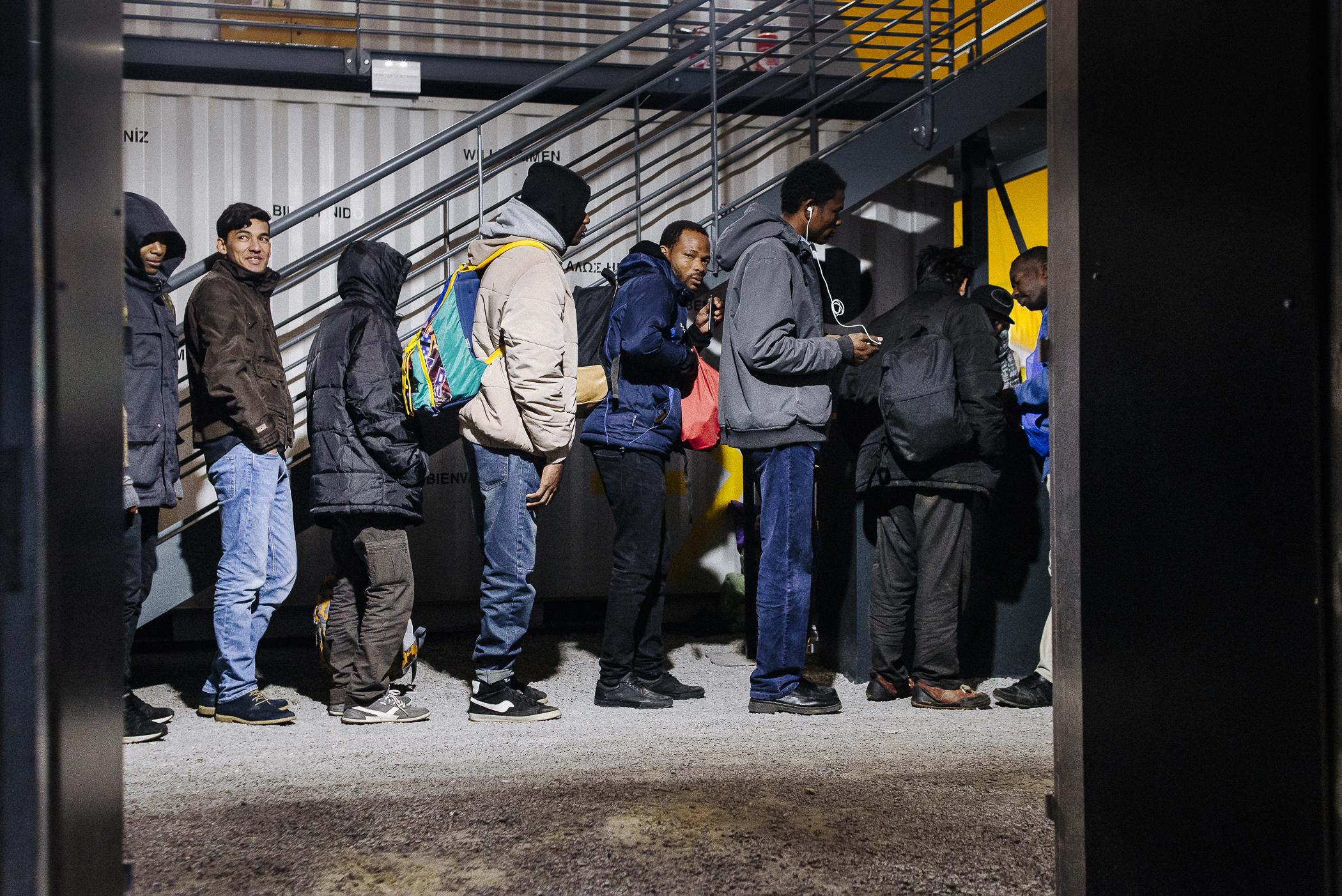
The first people cross the gates of the Center of La Chapelle. An employee of Emmaüs Solidarité gives each and every newcomer a ticket according to their order of arrival to later proceed with the administrative formalities in the relative comfort of the « Bubble ». November 25th, 2016, Paris (France).
A welcome unit has been set up in an inflatable bubble outside the building, where Emmaüs social workers can take charge of them. A " Health Unit " will enable the Samu Social to carry out a medical diagnosis, in particular a psychological one. Accommodation is provided in a permanent building, subdivided into eight islets, with prefabricated wooden rooms for four people.
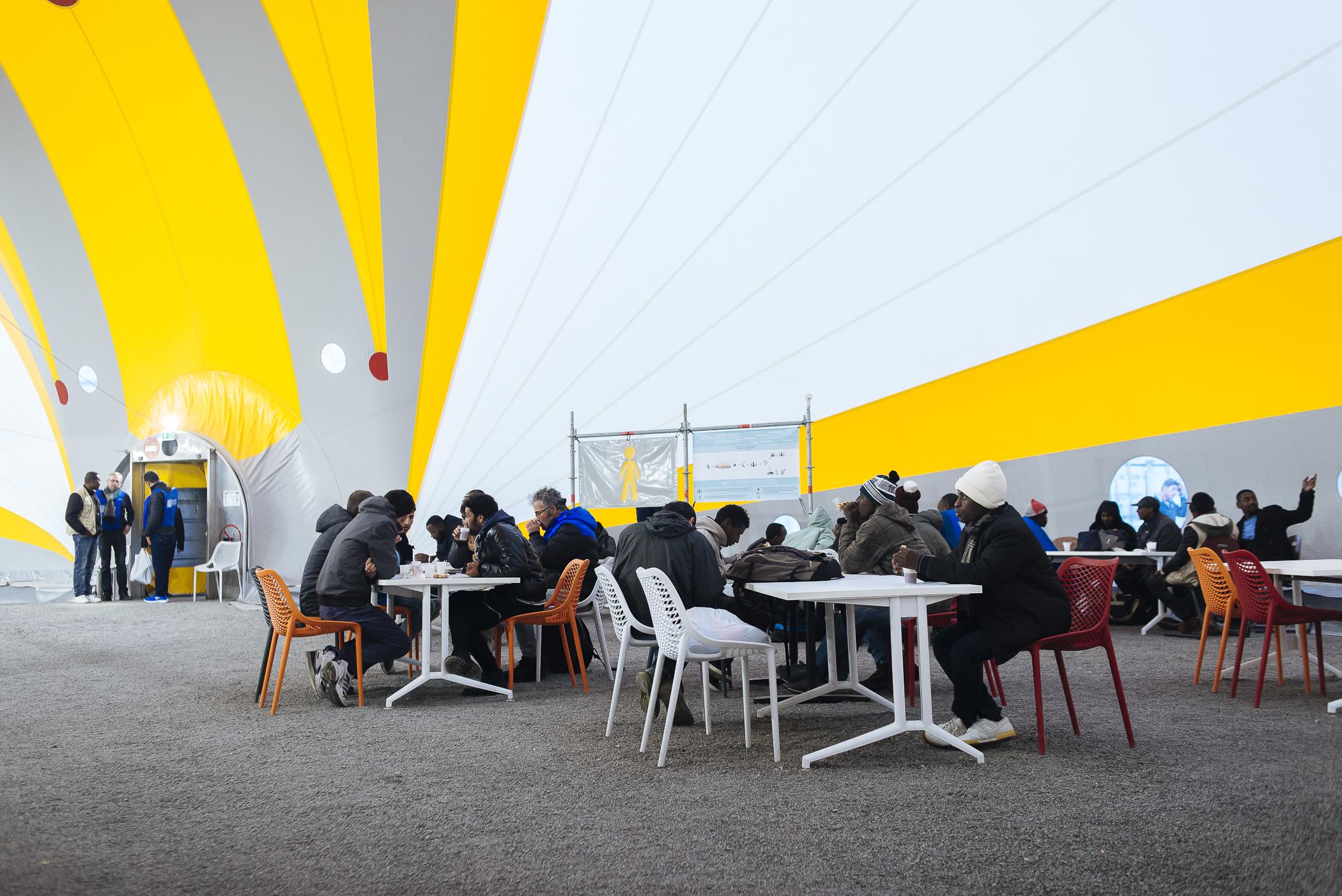
Once in the « Bubble » each person waits to be interviewed by Emmaus employees to determine the next step according to their administrative situation. Most of the people present are of Sudanese, Afghan, Eritrean and Somali origin. November 25th, 2016, Paris (France).
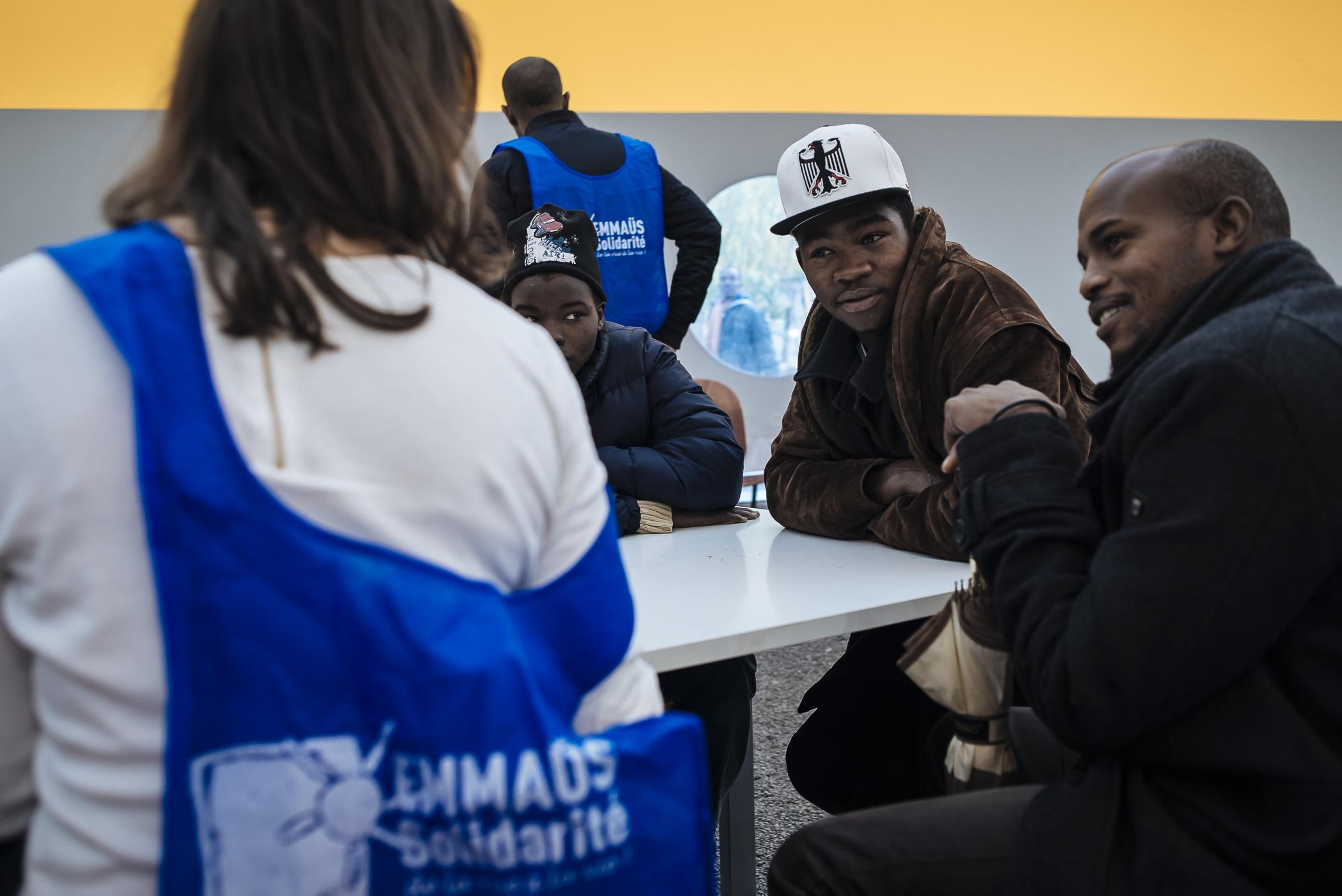
Emmaüs Solidarité volunteers who are recognizable by their blue jumper spend time with migrants. Cards games and French courses are improvised in order to entertain each other’s before one passes his individual interview in the presence of a translator if necessary. November 22nd, 2016, Paris (France).

After the « Bubble » each person accommodated is presented with an explanatory booklet in their native language (Arabic, Somali, Dari, Pashtun, etc.). This booklet provides all the necessary information for migrants who will be staying in the centre for around ten days. November 21th, 201, Paris (France).

The Emmaus teams meet regularly to review the day's priorities in the « Bubble ». On the left, a Dari speaking translator coordinates with the « Bubble » manager, seated at her desk. November 22nd, 2016, Paris (France).

During the day, the people staying at the centre don't have much to do. Many meet up with each other to talk. Residents can leave the centre but few do so for fear of the authorities and also of getting lost. The lack of money and local knowledge also explains why few stay in the centre. November 21st, 2016, Paris (France).

After an interview in the « Bubble » people enter the main building where they are allocated a bed. The employees of Emmaüs Solidarité also explain the rules governing the life of the centre and give them all the details and assistance they need to install them. Each newcomer is allocated a bed, padlock and a wardrobe to store his personal belongings in a 4 bed room. November 23rd, 2016, Paris (France).

On the initiative of volunteers of the association Utopia 56 skateboards are proposed to the people who wish it. Courses are thus improvised in the are reserved for the sport and where are present many equipment. A young Libyan is trying this sport relatively unknown in his home country and rather popular among the western urban youth. November 21st, 2016, Paris (France).

Many rigs have been installed outside to allow those who wish to do sport and a little exercise. A young Sudanese refugee, native of Darfur, tries under a winter sun. November 23rd, 2016, Paris (France).

Each « village » (there are eight in the centre) is assigned a specific colour (here purple) and a dedicated contact person. It also has a refectory with a television, where meals are served 3 times a day. Emmaüs Solidarité planned 8 areas for 50 people. Firstly, to be able to support people with more proximity. Then for people to feel better, not in a block with no soul, so they can rebuild a community, spend time together. November 21st, 2016, Paris (France).

Julien Beller, the architect had to build in less than three months more than 5,000 m2, heatable. with the obligation to design a project that was modular and could be dismantled 18 months after its opening. The site hosting the centre is a temporary one that still belongs to the railway company SNCF and will become a site of an university campus. November 21st, 2016, Paris (France).

A patient is waiting to meet Médecins du Monde (MDM) -a French medical NGO- psychologists who work several days a week and order the opportunity for those who wish to consult a specialist. Many people who are housed suffer from psychological problems, which are often translated into insomnia. November 22nd, 2016, Paris (France).

Once people have been authorised to enter the building, they are each allocated a bed in a room that has 4 beds. The centre is divided into 4 villages of 40 people each. Each village has its own toilet, shower and refectory. November 21st, 2016, Paris (France).

A. is a 33 year old refugee of Afghan descent. For 9 days he is been present in the centre, the maximum duration is 10 days normally. He comes from the town of Logar and owned a small grocery store. Insecurity forced him to leave his country. He is the father of seven children, all of whom remained in Afghanistan.

During the day, residents do not have many occupations. Many meet with each other to discuss. People may leave the centre but few do so out of fear of the French authorities and also of getting lost. Lack of money and local friends explain also the wish to stay in the centre. November 21st, 2016, Paris (France).

A resident checks his mobile phone thanks to a Wi-Fi network available free of charge on the site of the centre. In the background, the health centre where teams of doctors, nurses and psychologists are available every day. November 22nd, 2016, Paris (France).

A laundry area allows the housed persons to wash their clothes. They are deposited in the morning and can be recovered clean and dry in the afternoon. November 21st, 2016, Paris (France).

Each « village » (the centre has 8) has a refectory with a television, meals are served 3 times a day and everyone is free to go in during the day outside meal times. November 24th, 2016, Paris (France).

Every evening in each « village », a list of the departure of the next day is posted. Everyone then discovers whether to prepare to leave or not. In general, 2 departures per day are organized, one in the morning and one in the afternoon. People concerned meets members of OFII (French Migration and Integration Office) and Emmaüs Solidarité for more details. November 21st, 2016, Paris (France).

Every person housed can enter or leave as he wishes from the centre during opening hours, he must present his passport from Emmaüs Solidarité handed over upon arrival. Turnstiles are installed at the entrance to regulate the people coming in and out. November 21st, 2016, Paris (France).

In general 2 buses leave per day, people do not know their exact destination, only the general area. All this information is given to them when they board the bus. The persons whose names are on the departure list shall arrive at the time indicated at the place of rendezvous. Once his name is on the list, every migrant must show up at the departure of the buses, with his luggage and identification passport in the centre. An Emmaüs Solidarité social, Gérard, explains the details and ensures that everyone is present, then the migrants then get on the bus. November 22nd, 2016, Paris (France).